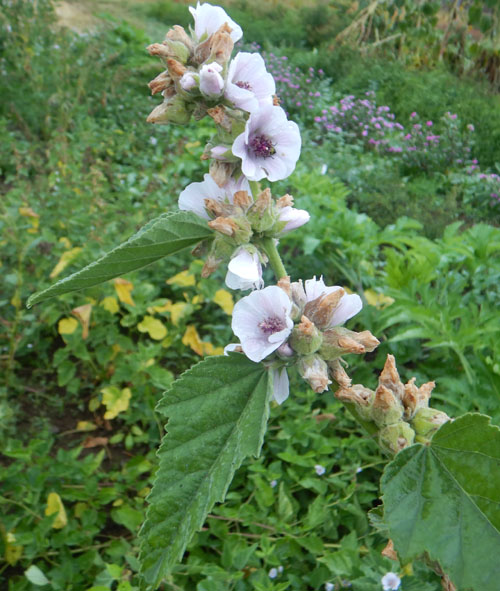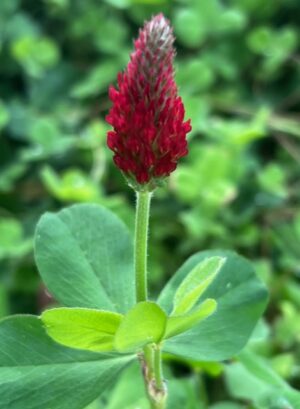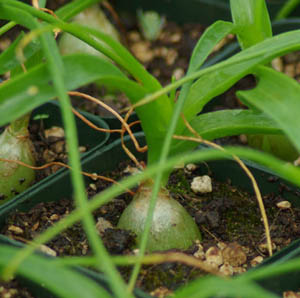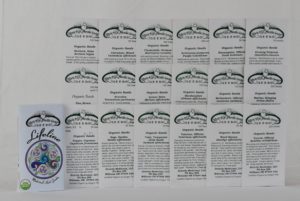Marshmallow (Althaea officinalis) seeds, organic
Price range: $3.95 through $44.10
Family: Mallow (Malvaceae)
Hardy to Zones 3 to 9
Herbaceous perennial native to Europe, flowering to 4 feet tall. The root is a nutritious food. Traditional usage (TWM): digestive, immune stimulant, ulcers. Plant prefers moist garden soil in the full sun or part shade. The plant likes regular watering and makes a lot of biomass, both above the ground and below. Sow in spring by scarifying seed on medium grit sandpaper, strewing on surface, barely covering with soil, tamping securely, and keeping evenly moist and warm until germination, which occurs in 1 to 2 weeks. Work seedlings up in pots or sow directly in garden. Thin or transplant to 2 feet apart.
Packet contains 100 seeds
1 g contains ~300 seeds
5 g contains ~1,500 seeds
10 g contains ~3,000 seeds
Certified Organically Grown








Alex Stone –
Hi Richo, thank you and everyone at SMS for wonderful plants and seeds! Im wondering about smaller scale equipment for shredding marshmallow and other roots, rather than chopping. Seems like shredding generates a product that would release more constituents than chopping (and mechanizing the process of making root pieces smaller/faster drying/more extractable would be very helpful). Thank you!
Upvote if this was helpful (0) Downvote if this was not helpful (0) Watch Unwatch Flag for removal
Richo Cech –
Hi Alex,
Thanks for contacting! There are a couple of potential directions for this and i do know what you mean about making more cell structure available for tea use. There is something called a Corona Mill that works for this. You want to smash and shred the roots without juicing them, and the corona mill set with plates far apart does do that. An apple eater (apple crusher) is another tool that may work well, as it is designed to smash without juicing. We use an apple crusher here quite frequently for processing fresh peppers to dry echinacea heads–breaking apart without damaging seeds. A hammer mill will destroy the roots for sure but they get pretty gloppy with that machine. If the roots are bound for extraction, then wash, cut in large pieces, put in Commercial Waring Blender with menstruum and whip up. This is really a big subject and as with all things herbal can be species-specific in terms of how to work it. Richo
Upvote if this was helpful (6) Downvote if this was not helpful (0) Flag for removal
Question
Desirae –
Hello! I would love to grow this, but I’m in zone 9. I have clay soil, and can keep the roots moist. There’s also a natural river source about 200′ from my growing location. Would love your perspective on how it’ll fare. Thank you!
Upvote if this was helpful (1) Downvote if this was not helpful (0) Watch Unwatch Flag for removal
Richo Cech –
Hi Desirae, Thanks for contacting. I checked the zones on this and actually you are in–marshmallow is good to a zone 9. The leaves are thick and velvety which usually imparts great cold and heat resistance, and in this day and age another worthwhile attribute–resistance against sunscald. Clay soils are fine–the taproot is quite tough and will go through them, and compost would be helpful. Your place sounds nice what with the river. richo
Upvote if this was helpful (2) Downvote if this was not helpful (0) Flag for removal
Alycia Skousen –
Planted seeds in greenhouse back in 2020. Plants come back every year in zone 5. Beautiful dark green leaves and pink flowers. So far I’ve used only in salads. Delicious!
Upvote if this was helpful (4) Downvote if this was not helpful (0) Watch Unwatch Flag for removal
rugosaswan (verified owner) –
Do these seeds need to be cold stratified? Also, how many weeks before the last frost do you recommend starting these if you are starting them indoors?
Thank you!
Upvote if this was helpful (0) Downvote if this was not helpful (0) Flag for removal
Richo Cech –
hello rugoswan, thanks for writing! Marshmallow is a standard warm soil germinator. It does like to be rubbed on sandpaper to increase germ rate but doesn’t need cold stratification. These are herbaceous perennials that are not picky about starting time. One good approach is to start indoors 6 weeks before the last frost. richo
Upvote if this was helpful (0) Downvote if this was not helpful (0) Flag for removal
Question
Heather Walton (verified owner) –
I overwintered my marshmallow plants in the garden. Can I harvest just some of the roots and replant the rest, year to year, or should I start from seed every season?
Upvote if this was helpful (1) Downvote if this was not helpful (0) Watch Unwatch Flag for removal
Richo Cech –
hi heather, good work. marshmallow can be divided, and the divisions can be used like you said, for more plants or for herbal use. you’ll see some conical projections with buds at ther crown–these make great plant cuttings–just pot them up as an intermediary and plant back out to the garden after they throw feeder roots. the long taproots are what you use for making the herb. r
Upvote if this was helpful (1) Downvote if this was not helpful (0) Flag for removal
Adam Binder –
The seeds germinated earlier than the package stated.
Upvote if this was helpful (2) Downvote if this was not helpful (0) Watch Unwatch Flag for removal
Deanna Deason –
Love that the bees love it, doing good for the environment
Upvote if this was helpful (3) Downvote if this was not helpful (0) Watch Unwatch Flag for removal
Christine Chandler –
Would this plant do well in lightly wooded are near a stream? Thanks.
Upvote if this was helpful (0) Downvote if this was not helpful (0) Flag for removal
Richo Cech –
yes
Upvote if this was helpful (0) Downvote if this was not helpful (0) Flag for removal
Question
Gale Webber –
Are all seeds from the US? I would like to know the origin of the seeds.
Upvote if this was helpful (0) Downvote if this was not helpful (0) Watch Unwatch Flag for removal
Richo Cech –
Hello Gale,
The marshmallow seeds and all the common organically certified medicinal herb seeds you’ll find here are grown at Strictly Medicinal Seeds in Southern Oregon, USA.
Richo
Upvote if this was helpful (2) Downvote if this was not helpful (0) Flag for removal
Question
Christine –
If I order marshmallow seeds in March and then put them in moist peat Moss in the refrigerator for 4 weeks and plant in Late April in hot the San Joaquin Valley, Ca, will they do okay? Should I plant them in AM sunshine, PM partial shady area?
Upvote if this was helpful (0) Downvote if this was not helpful (0) Watch Unwatch Flag for removal
Richo Cech –
Hi Christine, you don’t have to do this. just scarify on sandpaper and sow in warm conditions–marshmallow doesn’t need cold to germ. now is a fine time to plant. r
Upvote if this was helpful (0) Downvote if this was not helpful (0) Flag for removal
Varina –
I live in Colorado in zone 6b. Can I go ahead and plant these seeds now or is it too late in the season?
Upvote if this was helpful (0) Downvote if this was not helpful (0) Flag for removal
Richo Cech –
hi varina, it is good to get started on perennials–the sooner you start the sooner and better they size up. marshmallow planted now won’t get big until this time next year. richo
Upvote if this was helpful (0) Downvote if this was not helpful (0) Flag for removal
Question
Nancy Gerchak –
Are the leaves and flowers edible on the Marshmallow plant? How would you prepare the root for food? Also, are the roots of the High Mallow plant edible or useful?
Upvote if this was helpful (0) Downvote if this was not helpful (0) Watch Unwatch Flag for removal
Admin Richo Cech –
Hello Nancy,
The leaves and flowers of marshmallow and high mallow are edible. The root may be sliced thinly and stir-fried.
Richo
Upvote if this was helpful (1) Downvote if this was not helpful (0) Flag for removal
Maria Serpa –
Do you ship to Canada?
Thank you
Upvote if this was helpful (0) Downvote if this was not helpful (0) Flag for removal
Richo Cech –
Hello Maria. We do ship seeds to Canada. Here’s a link to the shipping policy from our homepage https://strictlymedicinalseeds.com/shipping-info/
richo
Upvote if this was helpful (0) Downvote if this was not helpful (0) Flag for removal
Alex –
How long should I expect it to take to grow roots large enough to harvest and dry for tea?
Upvote if this was helpful (0) Downvote if this was not helpful (0) Flag for removal
Richo Cech –
Hi Alex,
Not long. I have very recent experience with this as I dug a huge root that was no more than 6 months old–weighed a couple of pounds fresh–you could probably grow one to harvestable size in 3 months during the summer. Richo
Upvote if this was helpful (0) Downvote if this was not helpful (0) Flag for removal
Antonio (verified owner) –
Can you eat the marshmallow root raw? Can you eat the leafs of the marshmallow plant? Can you eat the marshmallow leaf raw or cooked?
Upvote if this was helpful (0) Downvote if this was not helpful (0) Flag for removal
Richo Cech –
hi antonio, i eat marshmallow root raw all the time. you can also cook it. this plant saved many irish from famine during the potato famine. the leaves are not so pleasant taken raw–they are fuzzy–you want to dry them and make the tea according to directions in “making plant medicine” Richo
Upvote if this was helpful (0) Downvote if this was not helpful (0) Flag for removal
Raaya (verified owner) –
I live in zone 8b (Whidbey Island WA), do you reckon I can successfully grow it here?
Is it deer resistant or should I fence it from our hungry deer neighbors?
Upvote if this was helpful (0) Downvote if this was not helpful (0) Flag for removal
Mayche Cech –
Hello Raaya, Marshmallow does grow on Whidby Island and deer are quite attracted to it. Richo
Upvote if this was helpful (0) Downvote if this was not helpful (0) Flag for removal
Adam (verified owner) –
If I grow the marshmallow in a big pot will the roots get large enough to harvest or is it best in ground? If I were to plant it in the ground would it spread like a weed?
Upvote if this was helpful (0) Downvote if this was not helpful (0) Flag for removal
Richo Cech –
Hi Adam,
The marshmallow is best grown in a pot until it is big enough to transplant to garden. Then it should be set to the garden to enlarge its root. It does not spread.
Richo
Upvote if this was helpful (0) Downvote if this was not helpful (0) Flag for removal
Stephanie (verified owner) –
Can you harvest the leaves in the first year of growth?
Upvote if this was helpful (0) Downvote if this was not helpful (0) Flag for removal
Richo Cech –
Hi Stephanie, Yes, this is quite acceptable and effective. r
Upvote if this was helpful (0) Downvote if this was not helpful (0) Flag for removal
Christine Chandler –
Oh, Oh! Forgot to ask about deer attraction to all the medicinal herbs I ordered! My bad. And we have quite a few on this 10 acres! They hide inbthe woods!
Upvote if this was helpful (0) Downvote if this was not helpful (0) Flag for removal
Richo Cech –
most medicinal herbs are not highly valued by deer as forage. think of it as soft-leaved, mucilage-laden herbs being a good choice for deer forage, and spiny, hard, aromatic herbs (like rosemary or sage) being quite unlikely to sustain deer damage.
Upvote if this was helpful (0) Downvote if this was not helpful (0) Flag for removal
Marvis Kisakye –
1. After how long from sprouting can I start harvesting the leaves?
2. After how long from sprouting can I harvest the roots?
Upvote if this was helpful (0) Downvote if this was not helpful (0) Flag for removal
Richo Cech –
60 and 120
Upvote if this was helpful (0) Downvote if this was not helpful (0) Flag for removal
Andrew –
Our plants our abundant, freely seeding nearby in the wet soils of our farm, giving us numerous new starts as well as healthy mature plants. Thank you! What is the preferred method of water extraction of the FRESH root?
Upvote if this was helpful (0) Downvote if this was not helpful (0) Flag for removal
Richo Cech –
Hi Andrew, good, its working! You can always just slice the fresh roots in thin rounds and let sit in a quart of cold water overnight. in the morning drink. Most of these high-mucilage plants are going to extract best as the cold infusion–see page 224 “Making Plant Medicine.” richo
Upvote if this was helpful (0) Downvote if this was not helpful (0) Flag for removal
GayLInda –
How about zone 4?
are they THAT frost hearty?
Upvote if this was helpful (0) Downvote if this was not helpful (0) Flag for removal
Richo Cech –
Hello Gay, Thanks for writing. If you click on the picture you’ll get the monograph which tells you such things. Marshmallow overwinters down to a zone 3, so you’re good. Richo
Upvote if this was helpful (0) Downvote if this was not helpful (0) Flag for removal